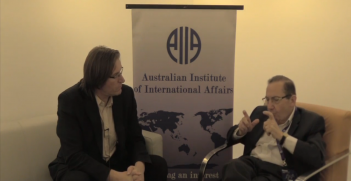The Key to Our Era, in the Asian Region and Beyond?

Has Francis Fukuyama once again provided the key to making sense of the confusion going on around us, including in our own Asian (or Asia-Pacific, or Indo-Pacific) region?
Fukuyama is well remembered as providing a framework for understanding what was emerging in the world, post-Cold War. We had reached, he said, “the end of History”: no “ideology with pretensions to universality” could possibly compete with liberal democracy. Another prominent scholar, Samuel Huntington, warned against this view, predicting there would develop a “clash of civilizations” — but his paradigm gained little support. In the 1990s the suggestion that the world was experiencing an ideological convergence around liberal principles was highly influential, including in Australia, and there seemed to be little point in investigating alternative civilizations or cultures. The beleaguered anthropologist Clifford Geertz remembered that questions “rained down” on the “very idea of a cultural scheme.” The international relations specialist, Bilgin Pinar, reported that in his discipline students were not pressed to be curious about the non-West. They were encouraged to explain away “non-Western” dynamics by “superimposing Western categories”.
Today we are in a different world: the United States leadership no longer champions liberalism and America is not now the hegemonic power it looked to be a quarter of a century ago. Global affairs now appear far more complicated, and such terms as “history”, “culture” and “civilization” are regaining respectability — though not particularly in Fukuyama”s new book.
In Identity: Contemporary Identity Politics and the Struggle for Recognition (London: Profile, 2018) Fukuyama offers “identity politics” as the new framing concept. He argues that halfway through the first decade of this century the advance to a liberal world order “began to falter” (5) and politics began to be “defined by identity”, with an emphasis on promoting the interests of such groups as “blacks, immigrants, women, Hispanics, the LGBT community, refugees, and the like” (6). This “politics of resentment” (7) is concerned with the dignity of particular groups — with gaining “recognition” for these groups (10). Identity politics, according to Fukuyama, has not only pushed aside politics “defined by economic issues” (6) but has also become a “master concept that unifies much of what is going on in world politics today” (xv).
I will not focus on the remedies which Fukuyama proposes to counter the divisiveness of identity politics, other than to mention they include the suggestion that “national service…would force young people to work together with others from very different social classes, regions, races, and ethnicities” and be a “contemporary form of classical republicanism…” (174). It is the question of how effective identity politics is as a master concept that is of immediate importance.
In suggesting how this preoccupation with recognition — this politics of identity — came about, Fukuyama examines Greek thought, and the development of individualism (of a sense of the inner self) which took place in the West and involves the imperative to seek recognition from others. What Greeks saw as the third part of the soul, thymos, is in humans the “the seat of judgements of worth” (18). According to Fukuyama, “human beings” — presumably all human beings — “do not just want things that are external to themselves, such as food, drink, Lamborghinis, or that next hit. They also crave positive judgements about their worth or dignity” (18). In this narrative, Fukuyama draws on Charles Taylor”s Multiculturalism and the “Politics of Recognition” (Princeton: Princeton University Press, 1992), and it is Taylor who, in fact, spells out how a person’s “own identity crucially depends on … dialogical relations with others” (34) — how “relationships are seen as the key loci of self-discovery and self-affirmation” (36).
The fact that Fukuyama’s narrative is essentially Western needs underlining. The claim to universality of the identity politics concept is a further problem. Liberal globalization may have faltered; but when Fukuyama argues that craving positive judgements about one’s worth (the desire for recognition) is “a universal aspect of human nature” (23), he is suggesting that ideological convergence is continuing, albeit on a new basis. The concept of identity politics, it is true, takes into account that different interest groups exist in the world — groups that define themselves by race, sexual orientation, and many other criteria — but it also sweeps them all together, in the sense that they are all said to be motivated by the same fundamental desire. In every case there is the same driver: the desire for recognition, grounded (in Fukuyama’s opinion) in this Greek idea of thymos.
In Australia’s regional context, Fukuyama’s insight reminds us, for instance, that how we categorize our neighbours and our neighbourhood is no superficial matter. Whether to speak of “Burma” or “Myanmar”, or how to handle aspirations toward a trans-national “Islamic” community: these are serious issues, matters of respect that may have an impact on the self- identity of the people concerned. Also, deliberation regarding whether to speak of the “Indo-Pacific region” — excluding the term “Asia” as it does — needs to take into account regional sensitivities and not merely Australian or American strategic convenience.
This said, however, there seems to be more going on in the world today than identity politics — at least as Fukuyama portrays identity politics. Growing opposition to liberal principles in many parts of Asia is a development that tends to be difficult for Australians to understand — and many are also confused and troubled when confronted by an Islamic wholesale rejection of secularism. With respect to inter-state relations in the Asian region, it is becoming clear that certain historic concepts may still be relevant. Does the widespread employing of such Western concepts as “nation state”, “sovereignty” and“balance-of-power” obscure the continuing influence of older hierarchical frameworks in the region, particularly the China-focused tribute system?
“Recognition”, it seems to me, is not just a matter of respecting different groups — but of understanding the perspectives which underpin their behaviour. Our current era is one of “cultural politics” as much as “identity politics” — in particular, of a contest between liberalism and other worldviews. Given the long-term dominance of liberal thought in Australian political and social life (as David Kemp’s recent writings have demonstrated) this contest is an urgent matter for Australia.
In considering “recognition” Fukuyama should perhaps have drawn more heavily on Taylor — who is more sensitive to cultural specifics, and the depth of genuine dialogue they can demand. Taylor’s Multiculturalism insists on the “willingness to be open to comparative cultural study” (73). Merely to offer respect to one group or another can be dangerous. Just to give “a favorable judgement on demand” could be seen as “an act of breathtaking condescension” (70). In the process of giving recognition to others, so Taylor suggests, we may have to tackle viewpoints that are “strange and unfamiliar to us”, and this can mean “transforming” our own “standards” (67).
It is a demanding process. Understanding what is important to others can lead us to revise our own cultural horizons: our own core beliefs and assumptions. Given Australia’s geographic and strategic location, and our huge economic dependence on China and other countries in the Asian region, Taylor’s observations are a warning of the challenge we are likely to face — culturally, or psychologically — in a long-term, Australian “recognition” of our neighbourhood.
To conclude, Fukuyama’s new book is helpful in reminding us of the different groupings demanding respect in our own Australian society — including, to be sure, Indigenous Australians — as well as throwing light on sharpening claims in the wider Asian region. Where Fukuyama is less successful — compared, for instance, with Charles Taylor — is in investigating the task of achieving real recognition. In the current era we can make no assumptions about achieving a convergence of aspirations. Also, the problems met in recognising one group may be very different than those we confront in dealing with another. At a time when “culture” and “civilization” have gained renewed currency, Fukuyama’s Europe-based “master concept” seems to hark back to the 1990s: an era in which analysts felt they could write with confidence about “global” or “universal” aspirations, and how they might be satisfied.
Professor Anthony Milner is a professorial fellow at the Asia Institute at the University of Melbourne, a visiting professor at the Asia-Europe Institute at the University of Malaya and a an Emeritus Professor at the Australian National University.
This article is published under a Creative Commons Licence and may be republished with attribution.




